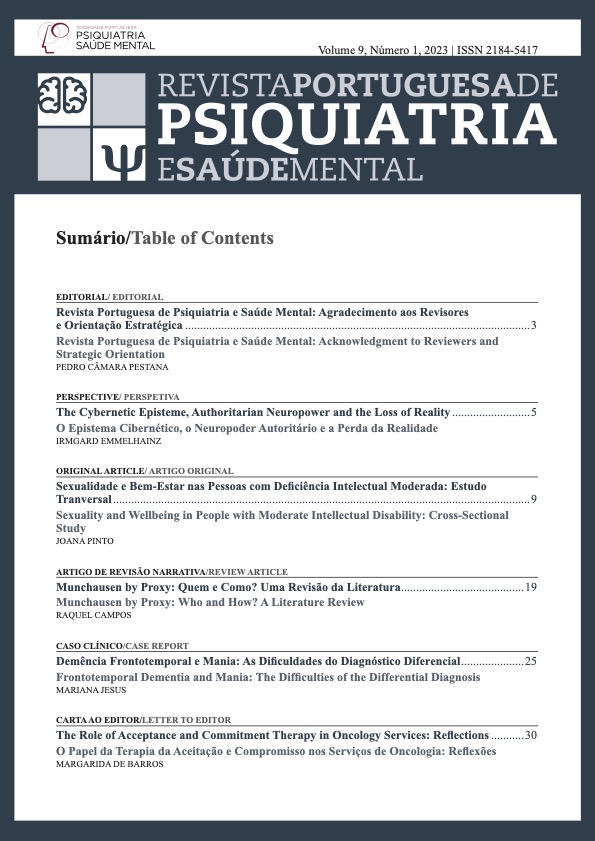Munchausen by Proxy: Who and How? A Literature Review
DOI:
https://doi.org/10.51338/rppsm.395Keywords:
Child Abuse, Factitious Disorders, Munchausen Syndrome by Proxy/diagnosis, Parents, Physician’s RoleAbstract
Munchausen by proxy syndrome is a relatively rare form of child abuse but with important short, medium and long‐ ‐term consequences for the child. In most cases, the abuser is the victim’s mother and deliberately and persistently acts by exaggerating, fabricating, simulating or inducing signs and symptoms in the child, leading Healthcare professionals to believe that the child has some real pathology, resulting in a fruitless diagnostic process. Little is known about
the perpetrators’ characteristics, namely about their personal history, psychiatric background and demographic characteristics, with the vast majority of the literature focusing on the victim’s characteristics. It is a challenging diagnosis and probably with an underestimated prevalence, therefore, this literature review intends to focus on the profile of the aggressors, in order to increase Healthcare professionals’ awareness to this matter and help them to make an earlier diagnosis.
Downloads
References
American Psychiatric Association. Diagnostic and statistical manual of mental disorders (DSM‐5 TR). Chicago: American Psychiatric Publishing; 2022.
Sheridan MS. The deceit continues: an updated literature review of Munchausen Syndrome by proxy. Child Abuse Negl. 2003;27:431–51. doi: 10.1016/S0145‐2134(03)00030.
Abeln B, Love R. An overview of munchausen syndrome and Munchausen syndrome by proxy. Nurs Clin North Am. 2018; 53:375‐84. doi: 10.1016/j.cnur.2018.04.005.
Yates G, Bass C. The perpetrators of medical child abuse (Munchausen Syndrome by Proxy) ‐ A systematic review of 796 cases. Child Abuse Negl. 2017; 72:45‐53. doi: 10.1016/j.chiabu.2017.07.008.
Sousa Filho D, Kanomata EY, Feldman RJ, Maluf Neto A. Munchausen syndrome and Munchausen syndrome by proxy: a narrative review. Einstein. 2017;15:516‐21. doi: 10.1590/S1679‐45082017MD3746.
Anderson APA, Feldman MD, Bryce J. Munchausen by Proxy: A Qualitative Investigation into Online Perceptions of Medical Child Abuse. J Forensic Sci. 2018; 63:771‐5. doi: 10.1111/1556‐4029.13610.
Morrell B, Tilley DS. The role of nonperpetrating fathers in Munchausen syndrome by proxy: a review of the literature. J Pediatr Nurs. 2012; 27:328‐35. doi: 10.1016/j.pedn.2011.03.008.
Abdurrachid N, Gama Marques J. Munchausen syndrome by proxy (MSBP): a review regarding perpetrators of factitious disorder imposed on another (FDIA). CNS Spectr. 2022; 27:16‐26. doi: 10.1017/S1092852920001741.
Feldman M, Brown R. Munchausen by Proxy in an international context. Child Abuse Neglet. 2001; 26: 509‐24. doi: 10.1016/s0145‐2134(02)00327‐7.
Schreier HA, Libow JA. Munchausen syndrome by proxy: diagnosis and prevalence. Am J Orthopsychiatry. 1993; 63:318‐21. doi: 10.1037/h0079426.
Rand DC, Feldman MD.An explanatory model for Munchausen by proxy abuse. Int J Psychiatry Med. 2001; 31:113‐26. doi: 10.2190/GBNF‐4XD7‐EKVC‐226P.
Bass C, Jones D. Psychopathology of perpetrators of fabricated or induced illness in children: case series. Br J Psychiatry. 2011;199:113‐8. doi: 10.1192/bjp.bp.109.074088.
Faedda N, Baglioni V, Natalucci G, Ardizzone I, Camuffo M, Cerutti R, et al. Don’t Judge a Book by Its Cover: Factitious Disorder Imposed on Children‐Report on 2 Cases. Front Pediatr. 2018;6:110. doi: 10.3389/fped.2018.00110.








